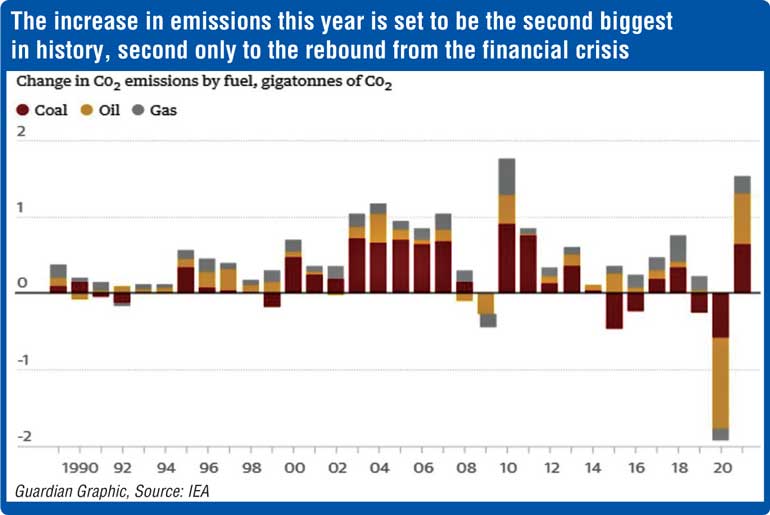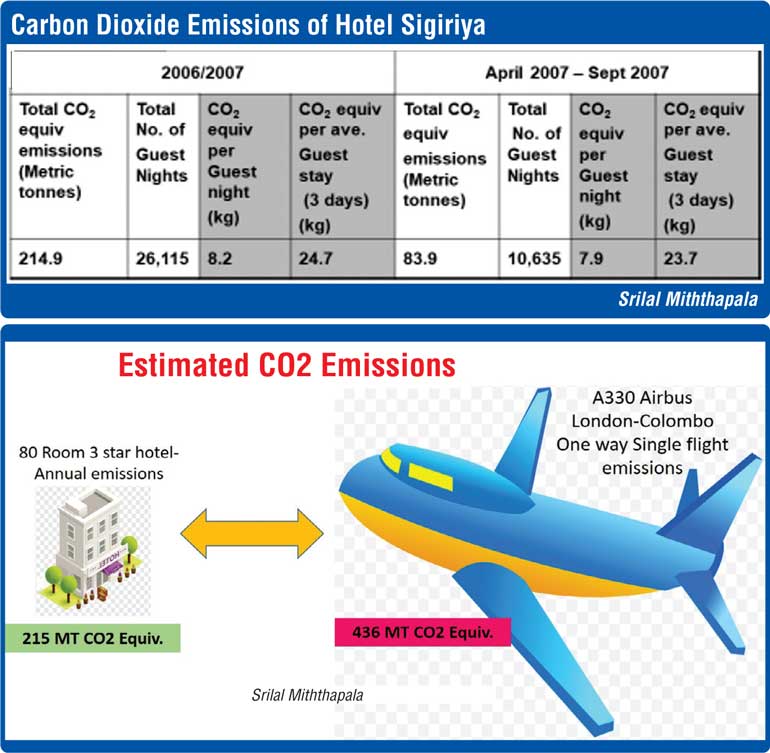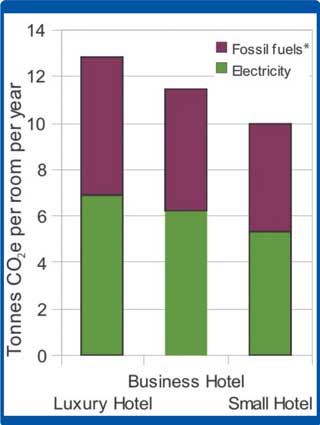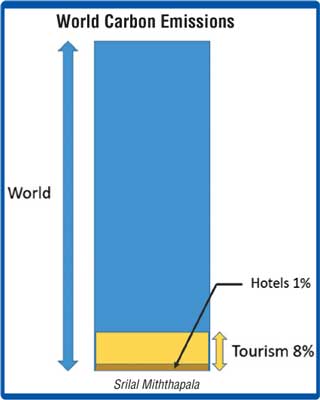Saturday Feb 14, 2026
Saturday Feb 14, 2026
Thursday, 5 August 2021 00:15 - - {{hitsCtrl.values.hits}}


It is not frequently that one hears of carbon emissions and related mitigation initiatives by hotels, both locally and abroad. This is in spite of the increased concern of global warming as a result of rising carbon emissions. This article attempts to analyse whether this is true, and if so, the reasons for the lack of focus on carbon emission mitigation by hotels
result of rising carbon emissions. This article attempts to analyse whether this is true, and if so, the reasons for the lack of focus on carbon emission mitigation by hotels
Global warming and carbon emissions is a subject that has dominated world headlines consistently over the past decade. The concerns are that increasing consumerism is fuelling large-scale fossil fuel usage and damage to the natural environment, resulting in a steep rise of carbon emissions, which results in global warming.
Global carbon dioxide emissions from energy use are set to rise by 5% in 2021 compared to 2020, the second highest year-on-year increase in history, according to a report published April 20 by the
International Energy Agency (IEA)
On the other hand there are a large number of sceptics who think that all the natural calamity that is now befalling the world, is being dumped at the doorstep of man-made carbon emissions. While there is widespread recognition that the climate, irrespective of the cause, is changing (88% believe this to be true), over 41% believing that climate change is being caused by both human activity and natural processes, while 46% believe human activity is the main cause. (See https://en.wikipedia.org/wiki/Global_warming_controversy - Report Public opinion on global warming)
https://en.wikipedia.org/wiki/Global_warming_controversy - Report Public opinion on global warming)
Hotels and carbon emissions
The hotel sector accounts for around 1% of global carbon emissions and this is set to increase. Hospitality, like other industries, has a responsibility to manage its impact on our planet.
As an industry, tourism accounts for 8% of annual global CO2 emissions, most of which is attributed to transport primarily a guest’s air travel, and to a lesser extent related to the delivery of products to a hotel or resort, staff transport, and emissions attributed to products consumed at a hotel.
The reason hotels do not actively track their CO2 emissions could be because it is very miniscule when compared to the airline component of emissions in the tourism value chain. From the total emissions from tourism-related activities about 40% comes from tourism transport, where airlines contribute the largest component.
My studies about 18 years ago at Hotel Sigiriya (we were the first hotel to measure our carbon footprint, at least approximately) revealed that the total for the hotel (80 rooms, 3-star) was only about 200 metric tons annually. The average modern aircraft emits about 200 kg of CO2 per km per passenger (https://andrewsteele.co.uk/climatechange/planetruth/numbers/). So an Airbus 330 flight (250 passengers) on single flight from London to Colombo (8,720 km) with 100% load factor would emit 200 x 250 x 8,720 = 436 Metric Tons (double what Hotel Sigiriya emits in one year).
This therefore, could lead to the conclusion that hotels do not actively track their CO2 emissions because it is so small compared to the other emissions in the tourism value chain.
Hotels and environmental sustainability
On the other hand quite a number of Sri Lankan hotels have embraced good sustainable consumption practices (SPC) in their operations, during the past decade or so. Hotels are today concerned about their water and energy consumption and waste. 
Reduced use of plastics, recycling, segregation and proper disposal of garbage, use of natural products for cleaning where ever possible, low flow faucets, dual flushing cisterns, alternate energy systems, LED lighting, etc. are some of the common SCP’s being implemented in Sri Lanka hotels.
It is fact that these good SCPs all contribute to help mitigate CO2 emissions and consequently, have a positive impact on climate change and greening. So even though it is not publicised, hotels do contribute to CO2 mitigation and reduction of global warming.
Conclusion
While hotels may not be focusing directly on carbon emission mitigation, they are certainly doing considerably well on implementing and practicing good SCPs, which in turn reduce CO2 emissions and actively help reduce global warming.
However as shown earlier individual mitigation via SCPs by hotels efforts are quite small. Therefore the only way reductions in hotel CO2 emissions can be made relevant is by aggregating a large number of hotels together and then perhaps trading the cumulative CO2 reductions.
References